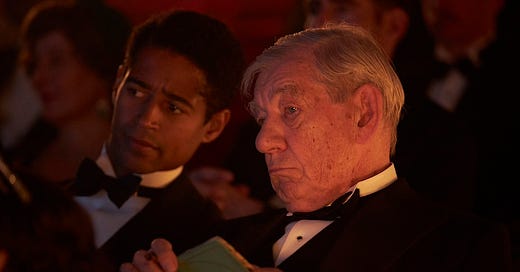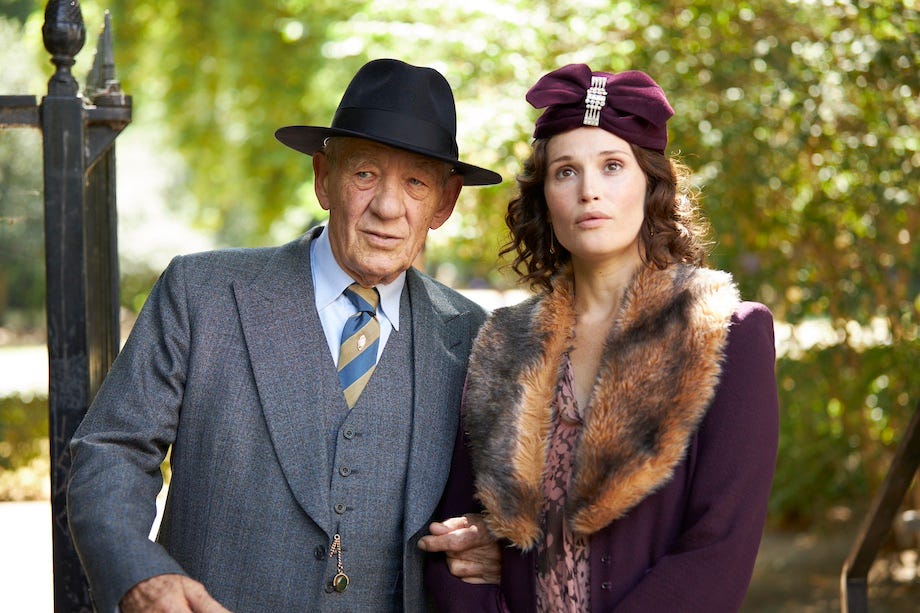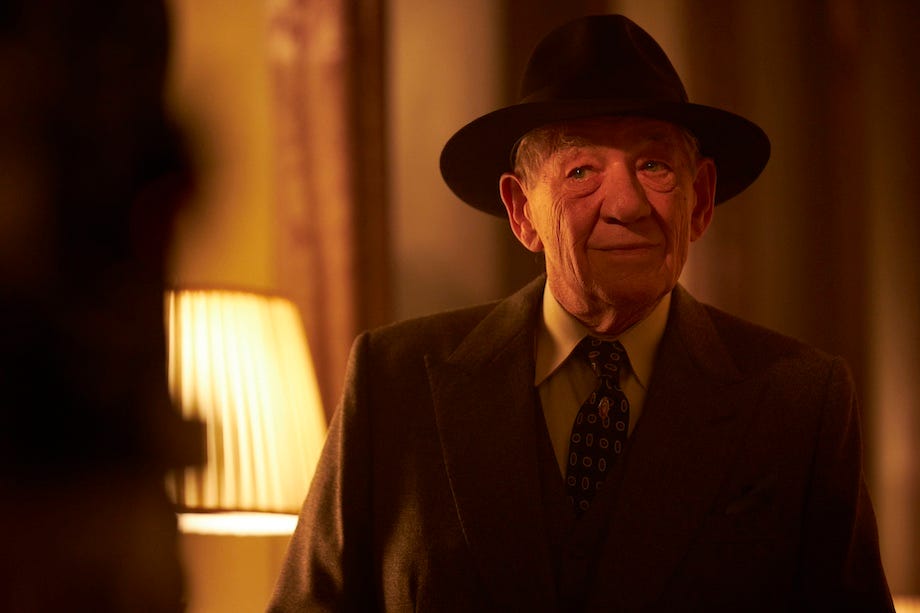Savaged by a frenzied pack of critics worldwide, Tom Hooper’s delirium-inducing nightmare clawed from the bowels of Andrew Lloyd Webber’s Cats is right down there with Joel Schumacher’s rubber nipple-tweaking Batman and Robin as one of the worst movies ever spat up like a sodden hairball. But at the very least, Ian McKellen knew exactly what he was in and hammed it up accordingly.
Star of the stage turned silver screen sheen-applier, the magnificent McKellen is a rare star who can bring both gravitas and impure mischief to the very same moment. With a voice as rich and creamy as marbled stone and eyes ablaze with mercurial glimmers, he smuggles CAMP into even the most strait-laced of roles.
Witness Gandalf the White, née Grey, eyes a-twinkle even in Middle Earth’s darkest hour. Or his tragicomic turn as Frankenstein’s other mother, proudly out Golden Age director James Whale, in Bill Condon’s seminal Gods and Monsters, introducing Brendan Fraser’s gardener – the object of his wizened desires – to Princess Margaret:
“He’s never met a princess, only queens.”
McKellen has sprinkled stardust in Tales of the City, swung a handful of Shakespearean kings, depicted disgraced politician Profumo, dipped into dictator Hitler and X-Men villain Magneto and danced as a Nosferatu in the video for Pet Shop Boys banger Heart. He is, therefore, perfectly cast as the anchor of the somewhat wobbly saucepot, The Critic.
Love me, love me
Adapted from the titillating page-turner Curtain Call penned by author Anthony Quinnby, it’s set in the 1930s and casts McKellen plays supercilious and oft-sozzled theatre critic Jimmy Erskine. Fond of spitting acid on the review pages of tabloid newspaper The Daily Chronicle, he’s an arch-villain loosely based on real-life career-shredder James Agate.
Jimmy thinks naught of savaging the best efforts of aspiring and highly-strung board-treader Nina Land (Gemma Arterton) who should, by rights, despise him. And she does, tearing up while shrieking over his takedowns in her hovel-like boarding house as her fretful mother (Phantom Thread’s Lesley Manville, underused but delightful) tut-tuts.
But Nina, a once hopeful starlet who has perhaps already missed her window, also idolises her adversary, winnowing her way into Jimmy’s life in the hopes of convincing him, by any means necessary, to sing her praises.
When the ancient proprietor of the Chronicle promptly pops off this mortal coil, thereby installing his unloved son Viscount Brooke (always good to see Mark Strong, even if he is rocking a wig surely pilfered from Nicole Kidman), things take a terrible turn for Jimmy. His new boss is less forgiving than the old man was of his shitting from a great height.
Far from taking the moral high ground, Brooke’s secretly besotted with Nina while wallowing in an unhappy marriage with Mary (Claire Skinner). Never missing a show, his glistening eyes in a darkened auditorium are spied by Jimmy’s handsome live-in secretary, Tom (Alfred Enoch), a Black British man and aspiring critic himself who almost falls foul of the local fascists frothing for the Fuhrer. This stewing plot is even saucier, given Nina’s having a fling with the Viscount’s brother-in-law, portrait painter Stephen (Ben Barnes).
Swishly wicked
A plotting queer critic, wing-waiting Nazis, landed gentry who can’t keep their wotsit in their pinstripes and a flailing not-quite-ingenue should all add up to a jolly romp indeed. But a strangely muted screenplay from Notes on a Scandal co-writer Patrick Marber oddly elects to excise a penny dreadful-style serial killer from Quinn’s potboiler, then ham-fistedly crowbars it back in with a less than convincing twist.
Under the similarly subdued stewardship of The Critics’ director, Anand Tucker, Arterton can’t quite convince us of Nina’s determination to win Jimmy’s praise. Similarly, there’s nowhere near enough here to flesh out why Enoch’s capable Tom would put up with his bitchy boss. Are they current or former lovers? It’s never very clear. Perhaps he’s simply working his way up in this treacherous world, but the film’s too-vague overtures of financial coercion are frayed, much like most of the movie’s too-woolly strands.
The various toffs mostly idle offscreen – no real loss, beyond Strong – but the disinterest with which The Critic writes off the life-threatening racism and homophobia of the day feels perversely sloppy. As is its later tilt into bitter misogyny, drained empty as a dirty bathtub. With these sordid threads, Marber needed to lean into the pulpy pastiche of ‘30s crime lit. Tucker, likewise, should have encouraged his actors to play to the cheap seats.
Thank goodness, then, for McKellen. Ever aglow in the spotlight – more a candlelit flicker in the lens of cinematographer David Higgs – he’s clearly relishing his defection to the enemy camp, swishing his critic’s cape with devilishly debonair panache. Upping the ante on the queer villain trope in excelsis, sadly there’s not enough here to reframe him as a beast of society’s making. While I suspect few five-star raves await, McKellen’s always worth the ticket, if only the surrounding film was as skilled at lathering suds into something more steamily sinister.
Elsewhere
Read my chat with Memoir of a Snail director Adam Elliott in The Saturday Paper.
I get theatrical with the troubled tale of Sunset Boulevard transferring from the screen to the stage for Sydney Opera House.
For ScreenHub I review kids’ film Runt, and the lovely third season of Heartstopper.
For SBS, I spoke to Mithila Gupta about creating her lush new rom-com Four Years Later, and Shaun Micallef about his Origin Odyssey with fellow comedians.
For the ABC, I met Neighbours alumnus Radha Mitchell and Jesse Spencer to chat Last Days of the Space Age, and the team behind My Old Ass.
A spooky season rapidly approaches, here’s my assessment of the latest spin on Salem’s Lot for Flicks.
And in Melbourne Fringe mode, I review Lady Macbeth Played Wing Defence for Time Out and chat to some of the creative spirits shining in the sixties for ArtsHub.






